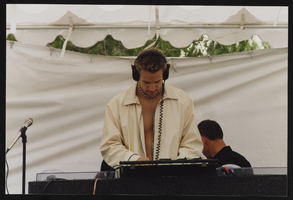Search the Special Collections and Archives Portal
Search Results
Paulette Canty oral history interview
Identifier
Abstract
Oral history interview with Paulette Canty conducted by Claytee White on July 02, 1998 for the Women's Research Institute of Nevada (WRIN) Las Vegas Women Oral History Project. Canty opens her interview by discussing her life in Las Vegas, Nevada in the 1960s. Canty talks about being one of the first students to be integrated in the Las Vegas school system. She discusses how the Clark County School District prepared African American and white students for integration. She describes how integration was positive for herself, but that it was a negative experience for her sister and other African American students. Canty also talks about how African American children were raised at the time, discussing the values instilled in boys versus girls. She also talks about her experience working in the gaming industry including as a manager at Bally's Hotel and Casino. She discusses the treatment of African American employees by the gaming industry and labor unions.
Archival Collection
Howard Cannon oral history interview
Identifier
Abstract
Oral history interview with Howard Cannon conducted by K.J. Evans on September 28, 1998 for the Las Vegas Review-Journal First 100 Oral History Project. Cannon discusses his political involvement and working for the Las Vegas City Attorney’s Office. He then talks about his service in the Air National Guard during World War II and creating Nellis Air Force Base. Cannon also mentions his interactions with presidents, his thoughts on the Vietnam War, his support for civil rights, and his stance as a lawmaker.
Archival Collection
Patsy Leavitt oral history interview
Identifier
Abstract
Oral history interview with Patsy Leavitt conducted by Patricia Van Betten on April 07, 2005 for the History of Blue Diamond Village in Nevada Oral History Project. In this interview, Leavitt talks first about her maternal grandmother, who brought her mother and uncle to Las Vegas, Nevada in 1931 and opened a boardinghouse that she ran until her death in 1948. She then discusses her father's family, who arrived in Las Vegas in the late 1920s and established a sand and gravel business. She describes her education and her working life in Las Vegas. She then talks about the many changes that Las Vegas went through in the 1950s, from road improvements to new businesses and the growth of the casino industry, to the impact of nuclear testing at the Nevada Test Site. Finally, she talks about her marriage, her children, and the decision to move to Blue Diamond Village in the early 1990s.
Archival Collection
Betty Dokter oral history interview
Identifier
Abstract
Oral history interview with Betty Ham Dokter conducted by Roger Jablonski on February 27, 1977 for the Ralph Roske Oral History Project on Early Las Vegas. Dokter describes church activity and the first casino properties that were built. She later talks about presidential visits, economic changes in Nevada, and the construction of Hoover Dam. The latter part of the interview covers the topics of racial minorities, as well as social and environmental changes.
Archival Collection
Rodel Fuentes oral history interview
Identifier
Abstract
Oral history interview with Rodel Fuentes conducted by Tracy Fuentes on December 4, 2021 for Reflections: The Las Vegas Asian American and Pacific Islander Oral History Project.
Rodel Fuentes tells stories of his upbringing in Manila, Philippines, where he was raised in a shared family home amongst his parents, siblings, aunts, and uncles. He talks about his parents' immigration to the United States and how he later joined them in Los Angeles, California where he met and married his wife. Rodel Fuentes shares the couple's decision to move to Las Vegas, Nevada, his work at Dunn Edwards paint company, and how he became a licensed general contractor and real estate agent where he now owns his own company. Rodel Fuentes discusses his thoughts on Las Vegas' diversity, affordability, restaurants, and Asian community. He also talks about experiencing anti-Asian hate, worsened by misconceptions and discrimination that came from the COVID-19 pandemic.
Archival Collection
Joseph Ostunio oral history interview
Identifier
Abstract
Oral history interview with Joseph Ostunio conducted by Claytee D. White on December 20, 2017 for the Remembering 1 October Oral History Project. In this interview, Joseph Ostunio discusses his early childhood in Las Vegas, Nevada and how he grew to love country music. He talks about the Route 91 Harvest music festival, which he attended with his friend in 2017. He describes the events of that weekend and the shooting on that Sunday, October 1, 2017, during which his friend was shot. Ostunio ends the interview with his feelings regarding Las Vegas and what he has learned about himself from this experience.
Archival Collection

Wade Maggert as the disc jockey for Club Utopia at Gay Pride, image 001: photographic print
Date
Archival Collection
Description
Image

Wade Maggert as the disc jockey for Club Utopia at Gay Pride, image 002: photographic print
Date
Archival Collection
Description
Image
Maury Soss oral history interview
Identifier
Abstract
Oral history interview with Maury Soss conducted by Nyla Petersen on February 20, 1980 for the Ralph Roske Oral History Project on Early Las Vegas. In this interview, Soss discusses his personal history and the history of Las Vegas, Nevada. Soss describes the casinos, clubs, and life in Las Vegas during the early 1930s, and running Fanny's, a dress store, with his mother. He also describes women's fashion in the 1930s and how modern styles have changed since the early twentieth century. Soss goes on to discuss the Helldorado Parade, the development of Las Vegas through its casinos and public works, and the entertainers who have performed over the years in Las Vegas. Soss then talks about the arts community in Las Vegas and the need for a greater artistic culture in the city.
Archival Collection
